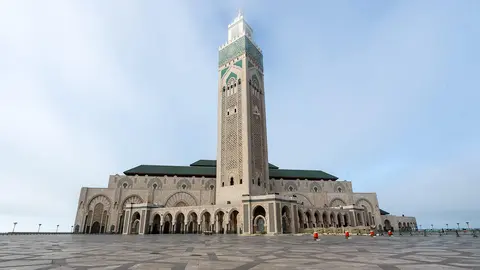More than 2 million believers converge on Mount Arafat to celebrate Hajj 1444

On the occasion of Hajj 1444, one of the five pillars of Islam, two million Muslims (340,000 from Saudi Arabia) have completed their most important journey. The celebration marks a turning point for Islam. The first day of the pilgrimage, known as Tarwiyah Day, was dedicated by the pilgrims to make supplications to atone for their sins in accordance with the customs of the Prophet Muhammad. They offered the Dhuhr, Asr, Maghrib and Isha prayers, and over the course of the next 24 hours will finalise their preparations to stand before God (wuqoof) on Mount Arafat.

For the first time since the start of the COVID-19 pandemic, a large-scale Hajj is taking place this year, and the Saudi authorities have implemented extensive plans to ensure the safe and smooth movement of pilgrims. A total of 2 million people are expected, including 1.6 million foreigners. Tuesday's Fajr prayer will be followed by the pilgrims' departure for Mount Arafat, the site of the prophet's last sermon, which was delivered more than 1,400 years ago.
More than 1 million Muslims from all over the globe are performing Hajj_e_Baitullah.
— Imran Khan (@ImranKhan_Force) June 27, 2023
May Allah accept their Hajj, Ibadaat, Prayers & all kind deeds.
#حج_1444 #عرفات #يوم_الترويه #Hajj23 #Hajj #يوم_عرفة pic.twitter.com/gfBR5e5APv
Since dawn, thousands of Muslims have flocked to the vicinity of Mount Arafat. The turnout has exceeded the expectations of the Ministry of Hajj and Umrah, who estimated lower numbers due to the high temperatures during the days of the celebration. Since the beginning of the week, the mercury bar did not drop below 43 °C, reaching 48 °C during some of the prayers. Despite the difficult weather conditions, medical staff were on high alert for heat exhaustion.
"The pilgrims were transported easily and according to the established schedule," according to the Ministry.
As a precautionary measure, Saudi institutions in charge of ensuring the safety of the pilgrims along with the city police, civil defence, Saudi Scouts and other security agencies were mobilised to ensure the safety of the pilgrims. Helicopters were used to guard the car parks which had been taken over by people.

On the rocky ascent to Mount Arafat, also known as the "Mount of Mercy", congregations of worshippers holding umbrellas against the glaring sun and reciting verses from the Qur'an formed an endless line. At Muzdalifah, a valley between Mina and Mount Arafat, pilgrims will pass through, where they will gather stones to be used in a special ritual the following day.

On the 10th of Dhul Hijjah, after the Fajr prayers, the pilgrims will leave Muzdalifah and head to Jamarat, where they will use the pebbles to stone the three pillars symbolising the devil. At the celebration both women and the elderly who may have serious difficulties in completing the various rituals can rely on a male member of the family who is able to complete the spiritual path.
Then, as they do after Umrah, the men must shave their heads while the women must remove a lock of hair. Slaughtering an animal and distributing the meat to the needy are additional requirements for practitioners. Those who are unable to do the sacrifice themselves can delegate a man to do it for them.

Praise for the organisation of the festival by the Ministry of Hajj and Umrah from all over the world was not slow in coming. Abdulhafeed al-Hamad from Sweden praised the services and goods provided by the Ministry of Hajj and Umrah. Also, the coordination with the Ministry of Health, who made available more than 6,000 beds in 32 hospitals in the country, has achieved a high level of satisfaction for the practitioner of the Islamic faith.
"We have taken all precautions; we have doctors here ready to help if needed," Hafizullah, a pilgrim from Afghanistan, told Arab News.
Yusifu Kargbo, from Sierra Leone, said: "This is an amazing Hajj. It is difficult to describe my feelings and emotions. I am experiencing great joy".
"I admire the warm hospitality extended to us during the pilgrimage. We were received very well in Jeddah upon our arrival, and throughout the stay I experienced a very supportive atmosphere," said Nazim Hussain Jafri, a pilgrim from New Delhi, India.
Mohammed Maarouf, a Syrian national living in Germany, said: "Thanks to the Almighty, I experienced a very good Hajj. It is very well organised by the Saudi government".









